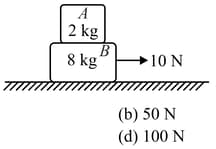Two-Block Problems
Two-Block Problems: Overview
This topic covers concepts, such as, Motion of Two Blocks on Horizontal Plane, Motion of Two Blocks on Inclined Plane, Condition for Relative Motion between Two Blocks & Motion of Two Blocks in Contact etc.
Important Questions on Two-Block Problems
Two blocks connected by a massless string slide down an inclined plane having an angle of inclination of The masses of the two blocks are and respectively and the coefficients of friction of and with the inclined plane are 0.75 and 0.25 respectively. Assuming the string to the taut, find the tension in the string.
Two blocks connected by a massless string slide down an inclined plane having an angle of inclination of The masses of the two blocks are and respectively and the coefficients of friction of and with the inclined plane are and respectively. Assuming the string to be taut, find the common acceleration of two masses.
Two blocks of masses and are placed on a horizontal surface as shown in fig. The coefficient of friction between the blocks is and that between the block and the horizontal surface is . What is the maximum horizontal force that can be applied to block so that the two blocks move without slipping ? Take
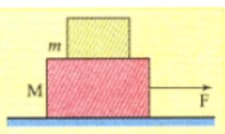
Blocks and are arranged as shown in the figure. The pulley is frictionless. The mass of is . The coefficient of friction between the block and the horizontal surface is . The minimum mass of , to start the motion, will be
A block of mass is placed on a plank of mass which is placed on a smooth horizontal plane, as shown in the figure. The coefficient of friction between the block and the plank is If a horizontal force is applied on the plank, then the maximum value of for which the block and the plank move together is
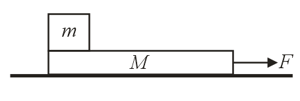
In the arrangement shown in the figure, if the blocks of masses and are released from the state of rest, tension in the string is ( coefficient of friction, string is massless and inextensible, pulley is frictionless)
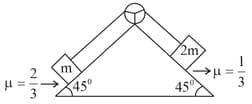
In the situation shown, the reading of the spring balance is

Block 1 sits on top of block . Both of them have a mass of . The coefficients of friction between blocks and are and . The table is frictionless. A force is applied on block to the left, and force on block to the right. Obtain the minimum value of such that both blocks move relative to each other and fill in OMR.

If force is applied to block as shown in diagram then maximum value of so that there is no relative motion between the blocks.

Calculate the accelerations of the blocks and

A force of is applied on the upper block as shown in figure. The coefficient of static friction between the two blocks is and that between the lower block and the surface is zero. The work done by the lower block on the upper block for a displacement of of the upper block is :-

In friction is present between only and limiting friction between . Find acceleration of

Two blocks connected by a massless string slides down an inclined plane having an angle of inclination of 37°. The masses of the two blocks are M1 = 4 kg and M2 = 2 kg respectively and the coefficients of friction of M1 and M2 with the inclined plane are 0.75 and 0.25 respectively. Assuming the string to be taut, find the common acceleration of two masses
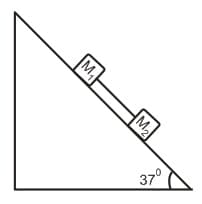
A block of mass sits on the top of a block of mass which sits on a table. The coefficient of kinetic friction between all surface is . A massless string is connected to each mass and wraps halfway around a massless pulley, as shown. Assume that you pull on the pulley with a force of . The acceleration of your hand is -

Two blocks masses 1 kg and 2 kg rest on a smooth horizontal table. When the 2 kg block is pulled by a certain force , the tension in the string is 1.5 N. The value of is

A slab rests on a frictionless floor. A block rests on top of the slab. The static coefficient of friction between the block and the slab is while the kinetic coefficient of friction is . The block is acted upon by a horizontal force of . If , the resulting acceleration of the slab will be
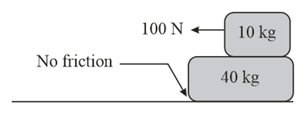
Two blocks of masses and are in contact on a smooth table. A force is first applied horizontally on a block of mass and then on mass . The contact forces between the two blocks in the two cases are in the ratio
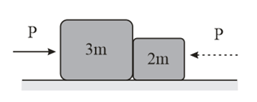
Block of mass 2 kg is placed over a block of mass 8 kg. The combination is placed on a rough horizontal surface. If , coefficient of friction between and floor =0.5, coefficient of friction between and = 0.4 and a horizontal force of 10 N is applied on 8 kg block, then the force of friction between and is

A block of mass is placed on a horizontal surface. Another block of same mass is kept on and connected to the wall with the help of a spring of spring constant as shown in the figure. is the coefficient of friction between and . The blocks move together performing SHM of amplitude . The maximum value of the friction force between and is
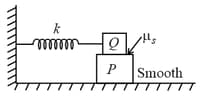
Block of mass 2 kg is placed over block of mass 8 kg. The combination is placed over a rough horizontal surface. Coefficient of friction between and the floor is 0.5. Coefficient of friction between and is 0.4. A horizontal force of 10 N is applied on block. The force of friction between and is
